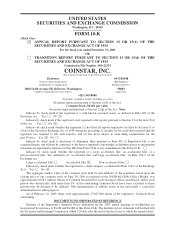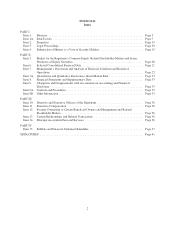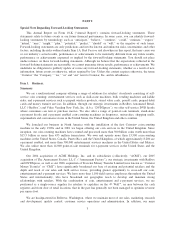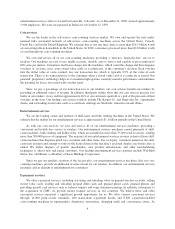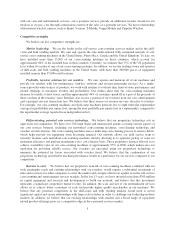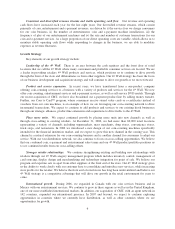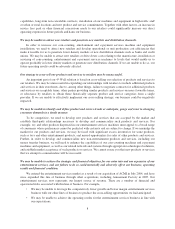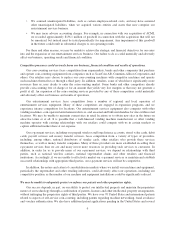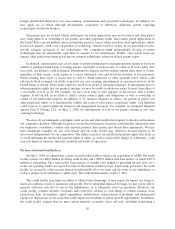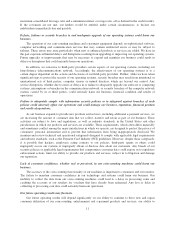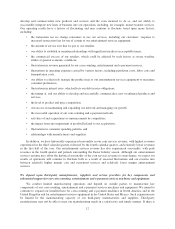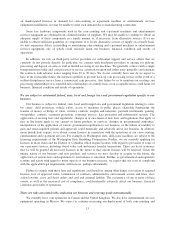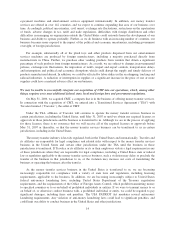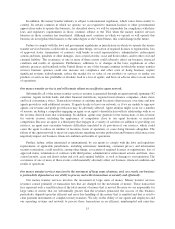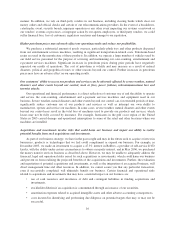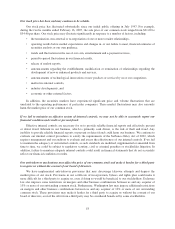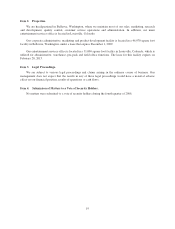Redbox 2006 Annual Report Download - page 13
Download and view the complete annual report
Please find page 13 of the 2006 Redbox annual report below. You can navigate through the pages in the report by either clicking on the pages listed below, or by using the keyword search tool below to find specific information within the annual report.maximum consolidated leverage ratio and a minimum interest coverage ratio, all as defined in the credit facility.
If the covenants are not met, our lenders would be entitled, under certain circumstances, to declare our
indebtedness immediately due and payable.
Defects, failures or security breaches in and inadequate upgrade of our operating systems could harm our
business.
The operation of our coin-counting machines and e-payment equipment depends on sophisticated software,
computer networking and communication services that may contain undetected errors or may be subject to
failures. These errors may arise particularly when new or enhanced products or services are added. We have in
the past experienced limited delays and disruptions resulting from upgrading or improving our operating systems.
Future upgrades or improvements that may be necessary to expand and maintain our business could result in
delays or disruptions that could seriously harm our operations.
In addition, we outsource to third-party providers certain aspects of our operating systems, including our
long-distance telecommunications network. Accordingly, the effectiveness of our operating systems is to a
certain degree dependent on the actions and decisions of our third-party providers. Further, while we have taken
significant steps to protect the security of our operating systems, security breaches may result from intentional or
unintentional acts of third parties, computer viruses or natural disasters, which are beyond our control. Any
service disruptions, whether due to errors or delays in or failure to adequately upgrade our software or computing
systems, interruptions or breaches in the communications network, or security breaches of the computer network
system, caused by us or third parties, could seriously harm our business, financial condition and results of
operations.
Failure to adequately comply with information security policies or to safeguard against breaches of such
policies could adversely affect our operations and could damage our business, reputation, financial position
and results of operations.
As our business expands to provide new products and services, including additional e-payment services, we
are increasing the amount of consumer data that we collect, transfer and retain as part of our business. These
activities are subject to laws and regulations, as well as industry standards, in the United States and other
jurisdictions in which our products and services are available. These requirements, which often differ materially
and sometimes conflict among the many jurisdictions in which we operate, are designed to protect the privacy of
consumers’ personal information and to prevent that information from being inappropriately disclosed. We
maintain and review technical and operational safeguards designed to comply with applicable legal requirements
and industry standards, such as the Payment Card Industry (PCI) guidelines. However, despite those safeguards,
it is possible that hackers, employees acting contrary to our policies, third-party agents or others could
improperly access our systems or improperly obtain or disclose data about our customers. Any breach of our
security policies or applicable legal requirements that compromises consumer data could expose us to regulatory
enforcement actions, limit our ability to provide our products and services, subject us to litigation and damage
our reputation.
Lack of consumer confidence, whether real or perceived, in our coin-counting machines could harm our
business.
The accuracy of the coin-counting functionality of our machines is important to consumers and our retailers.
The failure to maintain consumer confidence in our technology and systems could harm our business. Our
inability to collect the data from our coin-counting machines could lead to a delay in processing coins and
crediting the accounts of our retailers for vouchers that have already been redeemed. Any loss or delay in
collecting or processing coin data could seriously harm our operations.
Our future operating results may fluctuate.
Our future operating results will depend significantly on our ability to continue to drive new and repeat
consumer utilization of our coin-counting, entertainment and e-payment products and services, our ability to
11


